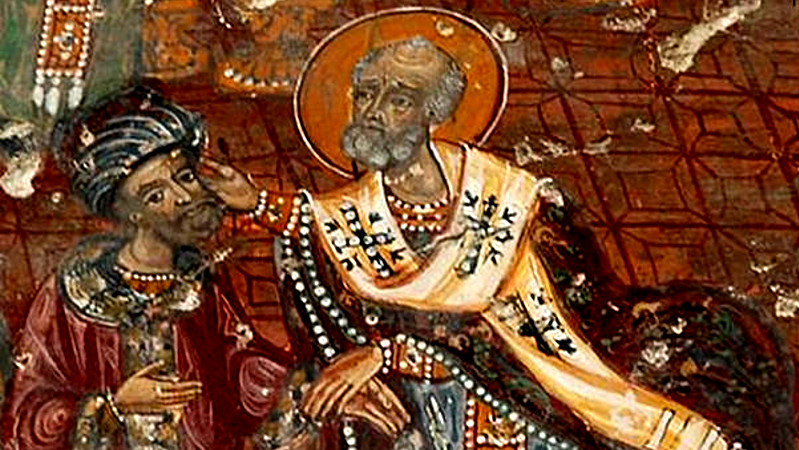Did St. Nicholas really slap Arius at the Council of Nicea? For a long time, I would have said, “Probably not.” But I’ve changed my mind. Read the story, and see what you think.
A return to Myra
It had been a dozen years since Nicholas had walked out of the Emperor’s prison and walked back to Myra. He’d doubted, sometimes, whether he’d ever live to see the world outside the prison walls. But he’d never for a moment doubted where he’d go or what he’d do if he were ever released. God had called him to Myra all those years ago, and made him the bishop there, even though he was too young, even though he was too inexperienced, even though he just wanted to disappear into silence and obscurity.
He’d had silence and obscurity in prison, and he was glad to have left it behind. He was the Bishop of Myra. He had to get back to his people.
And so, for the last dozen years, he had been working in Myra, restoring the church that had been devastated under the persecutions of Diocletian. He had baptized and catechized, heard confessions, restored people to communion. He had urged the rich to return their wealth to the poor. And if some thought his urgings went too far … he shrugged, and began softly chanting the Magnificat.
An unwelcome invitation
There was still the matter of the invitation from the Emperor that he had to deal with. The new Emperor. The one who ended the persecutions. Constantine. Not Diocletian. But how would a mouse feel on receiving an invitation from a cat?
He shook his head. That was nonsense. God had been with him in the Emperor’s dungeons once. If he had to spend time in the dungeons again, God would be with him again.
Besides, the danger to him was trivial. The Church herself was in danger. It wasn’t enough that the priest Arius was troubling his own bishop’s diocese. His teachings seemed to travel on the wind, and were causing dissension everywhere. If the Emperor wanted to help bring peace to the Church, then what could he say but “Blessed are the peacemakers”?
St. Nicholas at Nicea
The city of Nicea was full to bursting. Every room in every inn slept a dozen men or more. In the crowds, the confessors were easy to spot. Missing limbs. Blinded eyes. Ropy scars. Nicholas rubbed the bridge of his nose. He never complained of the headaches he still suffered from the blow that had almost killed him. By the grace of God, through the prayers of God’s Mother, with the help of his fellow prisoners, he had survived.
And here he was, in Nicea, with 300 or more of his fellow confessors, fellow survivors. And that’s if you count only the bishops. Add in the priests and deacons and subdeacons and readers, and the number approached 2,000.
Of course, they weren’t all confessors. Some had come to their office after the persecutions were over. Some had, by God’s mercy, escaped the notice of the Emperor’s men for all the years of persecution.
But of the church’s 1800 bishops, only 300 or so had accepted the Emperor’s invitation. Yes, travel was hard, and they had flocks to tend. But how many of them, on receiving the invitation, found their sleep troubled by dreams of another Emperor?
Nicholas shook his head. Perhaps he was the only one who had been troubled by dreams. And he knew the others would as willingly submit to prison again as he would, rather than betray the One who had sustained them through the harshest years.
Priest Arius and the Council
Bishop Nicholas was known as a practical man. He really wasn’t given to theological disputes. He had enough to do feeding the hungry, clothing the naked, anointing the sick, serving the Liturgy. Those were enough for him.
But never let it be said that Bishop Nicholas failed in his duty! He was invited here to listen and judge, and so he would. He listened carefully as Bishop Eusebius of Nicomedia explained what the priest Arius was teaching, citing the writings of St. Paul and the Holy Apostle and Evangelist John. Heads nodded here and there. There were questions, and some answered one way and some another.
At some point, Bishop Eusebius asked the Emperor if he might send a servant to fetch the priest Arius himself. Arius was not a bishop, of course. But rather than debating with each other about what Arius said, what he meant, they could hear from him directly. The Emperor consented. Nicholas nodded. That was wise.
In the eye of the storm
Arius entered the room with a sheaf of parchments in his hands, his own writings. He waited respectfully until he was addressed, and then simply, plainly, he began to read. The room was silent at first. Silent the way the night is silent before a storm. And then there were rustles, then rumbles, and then shouts. The confessors, men who had spent years beaten, chained, tortured, starved, alone except for the company of the God Man, Jesus Christ, couldn’t bear Arius’s words. Nicholas found himself standing up, walking to where Arius stood, speaking to him, over him.
Arius would not yield. He raised his voice. And Nicholas raised his hand and slapped Arius.
Arius staggered back. He might have fallen had one of the servants not caught him. And there was silence again. Awful, terrible silence. No one spoke. No one moved. And then the Emperor nodded to his guards. “Remove him.”
What the emperor forgot
The Emperor had, perhaps, forgotten that every bishop at his council remembered being removed by soldiers. Removed from the streets. Removed from their homes. Removed from their churches. Removed even when they held the sacred chalice in their hands.
And all those memories flowed into the silence. Memories of pain. Memories of hunger. Memories of isolation. And then memories of prayer. Memories of consolation, and even of joy. Their God, Christ, had suffered for them, had suffered with them. They remembered the sweetness of His presence. They remembered.
Into the silence, the Emperor spoke again. “Carry on.”
Memories and dreams
That evening, when the bishops left their deliberations, there was one name on every man’s lips. Nicholas. What had he done? What would happen to him?
And the confessors began to speak of their memories. Of where they had been when the Emperor’s guards had come for them. Of what had happened after. There were tears, and there was laughter, as fatigue and shadows and good wine took over.
The bishops went late to their beds that night, but sleep seemed elusive. When they dozed off, their sleep was full of dreams. Dreams of guards and chains and pain. Darkness and dungeons. And in the dungeons, in the dreams, there was Nicholas. But he wasn’t alone. The Lord Christ was with him. And Christ’s Virgin Mother.
Nicholas alone slept well that night. He was in a dungeon, yes. But he had been in dungeons before. As before, he knew that the Lord Christ was with him, and Christ’s Mother. He was not alone. He was not in danger. And so he slept.
When morning came, the bishops talked of Nicholas, and of their dreams. In their dreams, they had been in the dungeons, and Nicholas had been there. In their dreams, Nicholas was not alone. Christ God Himself was there, handing Nicholas a Gospel book. And the Mother of God was handing him his stole.
There was nothing to do but tell the Emperor. The discussions could not be resumed until Bishop Nicholas was back in his place among them.
Did this really happen?
Most historians consider this story unlikely, but not impossible.
To start with, there isn’t a single list of all the bishops who attended the Council of Nicea. There are several lists, some with more names, some with fewer. On the lists that are thought to be oldest and best, Nicholas of Myra does not appear.
However, there are old stories that say he was there. There is nothing in the oldest of these stories, though, about Bishop Nicholas slapping anyone, until 1370. That’s when Petrus, bishop of Equilio (near Venice), wrote, “It happened that saint Nicholas, now an old man, was present at the Council of Nicaea, and out of jealousy of faith struck a certain Arian in the jaw, on account of which it is recorded that he was deprived of his mitre and pallium; on account of which he is often depicted without a mitre.”
The fact that Petrus mentions “a certain Arian” and not “Arius” is small potatoes. Those sorts of details can change, and change back, as stories are told and retold. And we know that Bishop Petrus was retelling a story he’d learned from someone else. But we don’t know where he learned it, or when it was first told. His version is in Latin, but the story seems to come from Greek sources. And it would have taken the story time to make that journey. But how much time? How old is the story?
We simply don’t know.
Could St. Nicholas have been at the Council of Nicea, and while there, could he have slapped an Arian, been imprisoned briefly, and then restored? Yes, that’s possible. Nothing we know rules it out. But nothing confirms it, either.
The witness of the dreams
Yet there is one thing about the story that I think makes it likely that it happened. The dreams.
When I first heard the story, the dreams struck me as tropes, added because it’s a saint story, and saint stories need dreams or miracles. But, of course, the most famous story about St. Nicholas has nothing miraculous about it at all. Just an ordinary work of charity.
And the more I thought about it, the more these dreams struck me as real. If the story is true, you’d expect St. Nicholas’s fellow bishops, men who had been beaten and tortured and imprisoned for many years, to have had troubled dreams. Nobody had to make that up.
More stories from the life of St. Nicholas
Here are links to my telling of more of the stories from the life of St. Nicholas:
- A dowry for the widower’s daughters
- The unwilling bishop of Myra
- St. Nicholas and Arius at the Council of Nicea
- St. Nicholas takes the executioner’s sword
- St. Nicholas, patron of sailors
- St. Nicholas, deliverer from famine
Read More
Looking for the real St. Nicholas: When you see old men in red robes with white beards, how do you know if they’re intended to be Santa Claus or St. Nicholas? Check out the symbols and tropes in this post, and you’ll (almost) always be able to tell.
Book activities with The Saint Nicholas Day Snow: Extend the book with cooking, crafts, academic activities, and Advent devotions.
St. Nicholas, Thursday prayers, and pirates: Why do we commemorate St. Nicholas every Thursday in our weekly cycle of prayers? It all started in the year 842, when pirates captured the ship that was taking the poet Joseph to Rome.
Buy the Book: The Saint Nicholas Day Snow
Shoes or stockings? Horse or sleigh? Does St. Nicholas visit on December 6 or on Christmas Eve? Will a little girl’s prayer be answered? When Elizabeth has to stay at Catherine’s house, she’s worried about her grandmother, and worried that St. Nicholas won’t find her. The grownups, though, are worried about snow.
Celebrate the wonder of St. Nicholas Day through the magic of a book: The Saint Nicholas Day Snow. Available on Amazon, Bookshop.org, or my webstore.





Dear charlotte,
thanks for these interesting articles,I am a great follower of Saint Nicholas and would like to receive any other information and stories about our Saint
thanks and good luck
joseph
Besides the stories on my site, you can find more information and stories about St. Nicholas at The Saint Nicholas Center. The site is probably the most comprehensive source of information about St. Nicholas that there is.